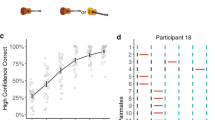Abstract
Damage to the hippocampus typically impairs spatial learning and memory in animals, but humans with hippocampal lesions retain spatial memories of premorbidly familiar environments. We showed that, like humans, normal rats reared in a complex environment and then given hippocampal lesions retained allocentric spatial memory for that environment. These results, which ruled out dependency on single cues, landmarks or specific routes, suggest that extensive premorbid experience leads to spatial representations that are independent of the hippocampus.
This is a preview of subscription content, access via your institution
Access options
Subscribe to this journal
Receive 12 print issues and online access
$209.00 per year
only $17.42 per issue
Buy this article
- Purchase on Springer Link
- Instant access to full article PDF
Prices may be subject to local taxes which are calculated during checkout



Similar content being viewed by others
References
O'Keefe, J. & Nadel, L. The Hippocampus as a Cognitive Map (Oxford Univ. Press, Clarendon, 1978).
Muller, R. Neuron 17, 813–822 (1996).
Burgess, N., Maguire, E.A. & O'Keefe, J. Neuron 35, 625–641 (2002).
Rosenbaum, R.S., Winocur, G. & Moscovitch, M. Behav. Brain Res. 127, 183–197 (2001).
Clark, R.E., Broadbent, N.J. & Squire, L.R. Hippocampus (in the press).
Teng, E. & Squire, L.R. Nature 400, 675–677 (1999).
Rosenbaum, R.S. et al. Nat. Neurosci. 3, 1044–1048 (2000).
Olton, D.S., Becker, J.T. & Handelman, G.H. Behav. Brain Sci. 2, 313 (1979).
Corkin, S. Nat. Rev. Neurosci. 3, 153–160 (2002).
Manns, J.R., Hopkins, R.O. & Squire, L.R. Neuron 38, 127–133 (2003).
Moscovitch, M. et al. in Dynamic Cognitive Processes (eds. Ohta, N., MacLeod, C.M., & Uttl, B.) 333–380 (Springer-Verlag, Tokyo, 2005).
Rosenbaum, R.S., Ziegler, M., Winocur, G., Grady, C.L. & Moscovitch, M. Hippocampus 14, 826–835 (2004).
Maviel, T., Durkin, T.P., Menzaghi, F. & Bontempi, B. Science 305, 96–99 (2004).
Wilson, M.A. & McNaughton, B.L. Science 265, 676–679 (1994).
Nadel, L. & Moscovitch, M. Curr. Opin. Neurobiol. 7, 217–227 (1997).
Acknowledgements
This work was supported by National Science and Engineering Research Council of Canada grants to G.W. and M.M. R.S.R. is supported by a Heart and Stroke Foundation/Canadian Institutes of Health Research postdoctoral fellowship. We thank H. Eichenbaum, P. Frankland and L. Nadel for their comments.
Author information
Authors and Affiliations
Corresponding author
Ethics declarations
Competing interests
The authors declare no competing financial interests.
Supplementary information
Rights and permissions
About this article
Cite this article
Winocur, G., Moscovitch, M., Fogel, S. et al. Preserved spatial memory after hippocampal lesions: effects of extensive experience in a complex environment. Nat Neurosci 8, 273–275 (2005). https://doi.org/10.1038/nn1401
Received:
Accepted:
Published:
Issue Date:
DOI: https://doi.org/10.1038/nn1401
This article is cited by
-
From cognitive maps to spatial schemas
Nature Reviews Neuroscience (2023)
-
Astrocytes in CA1 modulate schema establishment in the hippocampal-cortical neuron network
BMC Biology (2022)
-
Predicting real world spatial disorientation in Alzheimer’s disease patients using virtual reality navigation tests
Scientific Reports (2022)
-
Flexible use of allocentric and egocentric spatial memories activates differential neural networks in mice
Scientific Reports (2020)
-
Finding the engram
Nature Reviews Neuroscience (2015)



